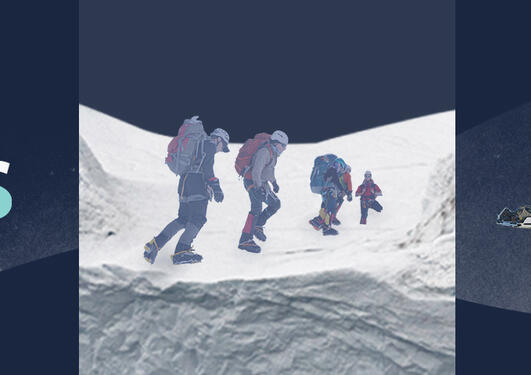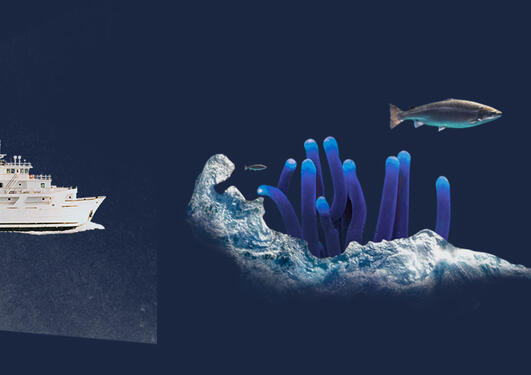Research possibilities for two MSCA SEAS postdoctoral research fellows in smart marine sensor technology, acoustics, or nano technology
The information on this page is a supplement to the complete advertisement of the position in the recruitment-portal Jobbnorge. The full advertisement of this position in Jobbnorge will be available after August 1st, and linked from this webpage. Call deadline is October 31st, 2022.
Hovedinnhold
Key information
Two (2) positions | Two MSCA SEAS postdoctoral research fellows at Centre for research-based innovation - SFI Smart Ocean, Department of Physics and Technology |
Jobbnorge title | Two MSCA SEAS postdoctoral research fellows in smart marine sensor technology, acoustics, or nano technology |
Topical frame | Measurement technology for smart sensors in an underwater network and nano technology for anti-biofouling |
Contact | Centre Director Marie Bueie Holstad (marie.holstad@uib.no) |
Mobility | For two incoming candidates (see mobility rules) |
Unit of employment | Department of Physics and Technology at University of Bergen |
Group affiliation | SFI Smart Ocean/other groups depending on project |
Thematic area and contact
There are two available postdoctoral positions related to measurement technology for smart sensors in an underwater network and nano technology for anti-biofouling. The research topics should be related to one of the following areas:
- Acoustic measurement technology for non-destructive integrity measurement of underwater installations using ultrasonic guided waves
- Nanotechnology within one of the two following subject areas:
- Diamond-based sensors for subsea monitoring
- Anti-biofouling coatings for subsea solutions
- On-board pre-processing and optimization for marine smart sensors (microelectronics/measurement science)
Applicants must specify clearly which research area the application is aimed at. Only one fellow will be hired per area. In the case of not receiving applications from qualified candidates for at least two of the research areas listed above, UiB will consider employing two fellows within the same research area.
The research must be directly or indirectly relevant to the scope of SFI Smart Ocean.
The positions are open only to incoming candidates, see mobility rules. The successful candidates will be employed at the Centre for Research based innovation, SFI Smart Ocean, at the Department of Physics and Technology.
Information about the possible research groups and research possibilities for the two fellows is given below.
Please contact the Centre Director for SFI Smart Ocean, Marie Bueie Holstad, Department of Physics and Technology, +47 92054529, marie.holstad@uib.no for further information. Upon contact, potential applicants will be directed to relevant potential supervisors who will be able to offer advice towards the development of a research proposal.
Research possibilities and resources
In the Centre for research-based innovation - SFI Smart Ocean you will participate in a leading research- and innovation cluster within marine instrumentation and operation. The mission for the Centre is to develop a novel sensor- and communication system to secure sustainable ocean industry operation and fact-based management of ocean resources. The research focus is on development of a completely new method to gain information from the ocean and ocean industries, highly relevant for sustainable marine management. Through SFI Smart Ocean, there are available different test and pilot ocean and coastal demonstrators where underwater communication systems and smart sensors will be tested.
Your research will be in close cooperation with research, industry, and public partners in the innovation centre, 18 partners in total. The Centre operates in the period 2020 (December) to 2028.
There are two available positions related to measurement technology for smart sensors in an underwater network and nano technology for anti-biofouling. The research topics should be related to one of the following areas:
- Acoustic measurement technology for non-destructive integrity measurement of underwater installations using ultrasonic guided waves
- Nanotechnology within one of the two following subject areas:
- Diamond-based sensors for subsea monitoring
- Anti-biofouling coatings for subsea solutions
- On-board pre-processing and optimization for marine smart sensors (microelectronics/measurement science)
Applicants must specify clearly which research area the application is aimed at. Only one fellow will be hired per area. In the case of not receiving applications from qualified candidates for at least two of the research areas listed above, UiB will consider employing two fellows within the same research area.
There are potential supervisors for the two fellows in the following research groups at the Department of Physics and Technology:
The Acoustics research group conducts education and basic research in physical acoustics, with focus on ultrasound in fluids and solids. Theoretical studies and numerical simulations of acoustic transducers and wave propagation are combined with experimental measurements in laboratory and field. The Acoustics group laboratory has facilities for precise ultrasound measurements in gases, liquids, and solids, including production and characterization of transducers. The way from research to applications is often short, and the staff has extensive industry background. The Acoustic group collaborates with other research groups at the department as well as numerous research institutes and industry partners – bilaterally and through participation in the centres SFI Smart Ocean and CRIMAC. Some relevant application areas are marine research, ocean technology, flow measurement, fluid characterization, non-destructive testing/evaluation (NDT/NDE), and structural health monitoring.
The Nanophysics research group focuses mainly on experimental research, and the supervisors relevant for this call works within new nanoscience instrumentation, fundamental properties of 2D materials, smart surfaces, and nanocrystalline diamond films. The group has two, unique home-built microwave plasma enhanced chemical vapor deposition systems dedicated for the deposition of diamond. In addition, a state-of-the-art quantum diamond microscope and equipment dedicated for the characterization of diamond electrical, chemical, and optical properties. Furthermore, the group has a dedicated nanostructures laboratory, equipped with electron beam lithography, e-beam evaporation and reactive plasma etching as well as a range of characterisation equipment including contact angle and optical and atomic force microscopy as well as unique, home-built helium atom scattering instrumentation. The nanotechnology group has close collaborations with the Institute for Materials Research at Hasselt University, Belgium in the field of diamond growth and doping and with the Australian National University in the field of quantum science. Within the area of smart Surfaces, the group cooperates with MPI-Stuttgart, University College London, Universidad Autonoma de Madrid and Norce Research Institute. The group recently coordinated the Meranet project ISOS on smart surfaces for anti-icing purposes and is currently coordinating the EU project Nanolace (www.nanolace.eu) as well as a Marie Curie Fellowship project.
The microelectronics group has traditionally been connected to space physics, sub-atomic physics, and medical physics, where the design and integration of readout electronics of advanced sensors in harsh environments is in focus. The common denominator between space, Large Hadron Collider experiments at CERN and medical physics devices is that the electronics is in radiation environments with little or no accessibility, and high reliability is therefore crucial. The use of Field Programmable Gate Arrays (FPGAs) is important in all fields.
The measurement science group works on developing and improving sensor and instrumentation technology to provide experimental measurement data of the highest possible quality and/or accessibility. The measurement technology applies to various applications in research and industry, especially relating to energy technology and ocean technology.
Possibilities for collaboration with other sectors
The candidates have the possibility of collaborating with researchers and industry partners of SFI Smart Ocean on communication and network technology, software architecture, data handling for smart sensor networks, and machine learning. The end users of the smart ocean sensor network are ocean industry, authorities for ocean governance, and marine scientists.
Potential for policy impact
SFI Smart Ocean aims to create a wireless observation system for multi-parameter monitoring of underwater environments and installations. The system, based on autonomous smart sensors, will serve as an enabling fundament to realize flexible, distributed, robust, energy efficient, cost-effective, and safe marine measurements and big-data handling, to solve societal and industrial challenges. The technology will enable increased autonomy for sustainable and profitable ocean industry operations, and fact-based ocean resource management; important to both ocean industries and authorities.
Potential other groups at UiB that may offer a co-supervisor (for cross-disciplinary work)
- Petroleum and Colloid chemistry, Department of Chemistry
- Physical Oceanography, Geophysical Institute
See the full advertisement in Jobbnorge
The full advertisement in Jobbnorge will be available after August 1st, 2022. Call deadline is October 31st, 2022.
Important general information
Please be aware
- That until August 1st 2022 (official call opening), the information on this page must not be considered as final, as adjustments may be done! There might also be minor adjustments in the Guide for applicants and the templates needed for applying.
- That the application process is time-demanding and requires a close dialogue with name-given available faculty supervisor or contact who, close to the deadline, must sign a supervisor match declaration if an application is to be eligible.
- That some fields of research, especially within sensitive technology areas, might be enforced by Norwegian and international regulations regarding Control of the Export of Strategic Goods, Services and Technology. Candidates who by assessment of the application and attachment are seen to conflict with the criteria in these regulations might be prohibited from recruitment to UiB.

